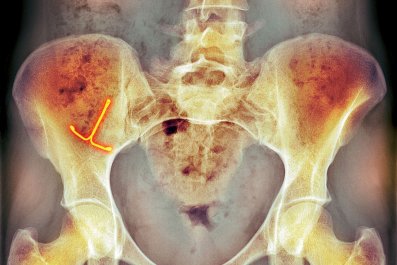Organic food, prepared as simply as possible or, preferably, left raw. Frequent sessions with a spiritually inclined fitness practitioner, working toward the health of both mind and body. Nontraditional healing techniques rather than those of Western medicine. And of course, regular detoxifying cleanses.
That may sound like a health regimen penned by Gwyneth Paltrow (whose online publication Goop is a paean to self-actualization, a process that now seems to include divorce), but it's actually the discipline for a different kind of animal: the American dog.
In recent years, upscale pet owners have been turning to alternative treatments and seeking out services like acupuncture, yoga classes and even cleanses for their beloved companions. Dr. Jeffrey Levy, a veterinarian and certified veterinary acupuncturist in New York City, has seen a marked increase in patients. "I have pet owners tell me all the time about how transformative acupuncture has been for their pets," he says. "They'll pick up a toy they haven't played with in years, or start digging in the dirt like a much-younger animal. The pets are really rejuvenated by the treatments."
Though he doesn't rely on acupuncture exclusively and cautions patients against using the treatment without exploring possible underlying causes of any problems, Levy argues that it can be highly effective, particularly for pain management and orthopedic conditions, such as arthritis or a bad back.
Margo Spellman, a Seattle-based artist, says acupuncture changed the life of her 8-year-old Havanese, Zapeato. "He was limping and had a twisted pelvis. I'd taken him to the chiropractor before, which helped for a while, but then the effects wore off," she says. "I was really desperate to find something to help with his pain, and I didn't want to resort to drugs."
Spellman herself has benefited from massage and acupuncture in the past, and after some research, decided to try them for her dog.
Marlo Fogelman, the owner of a Boston-based marketing and communications firm, saw similar results with her shih-poo, Lulu. "Lulu developed a back problem that was causing her so much pain she would yelp when she was touched." Unwilling to rely on the medication prescribed by her vet, Fogelman started looking for an animal acupuncturist. "Once we started her on acupuncture, Lulu's yelping went away almost immediately. It's taken away her pain, and we didn't have to use drugs."
Dog yoga, also known as "doga," is another popular alternative-health option for pet owners. Suzi Teitelman, who claims to have founded the discipline back in 2001, says it will lead to happier, healthier pets that are more bonded to their owners. "Dogs are pack animals, so they're a natural match for yoga's emphasis on connection with other beings," Teitelman says. "It absolutely offers the same benefits as regular yoga—strength, flexibility and peace—but probably the most important takeaway for dogs and their owners is the bonding it creates."
Teitelman compares dog yoga to infant yoga; pet parents move the animals through the poses or involve them in their own poses. She has trained several doga instructors and offers DVDs for pet owners who can't find classes near them.
Shanna Olson, a Hollywood "dog mom" to two Pomeranians, raves about doga. "Jack is very high-strung, and since we've been doing doga, he seems much less nervous and anxious," she says. "He used to lick the walls when I would leave, but now that's stopped. And Isabella has always been a little overweight, but she hates going on walks. This has been great exercise for her."
Doga isn't the only new age fitness option available for dogs. Jaime Van Wye, CEO and founder of the Zoom Room dog training center, has recently begun offering classes in "pup-lates" (a canine variant of Pilates). "Pup-lates combines physical fitness and low-impact agility training with a mental component called 'puzzling,' which includes a lot of thinking games for the dogs, such as a training drill where owners use rewards (like dog treats) to teach their dogs to track the scent of their footsteps," Van Wye says. "It's great for older animals, animals with attention issues and overweight animals who might not have the stamina for higher-impact activities."
Not everyone is enthusiastic about the potential of these therapies. Louise Murray, DVM and DACVIM (Diplomate, American College of Veterinary Internal Medicine) and the vice president of the ASPCA Animal Hospital in New York City, cautions pet owners that more research into all of these treatments is needed. "There is some evidence of possible benefits from acupuncture, but there just haven't been enough well-designed studies on the topic," she says. "At this point, we are a long way from safe, educated use of any alternative medical approach for dogs and cats. These fields are yet to be fully explored even in human medicine."
Though Murray cautions pet owners that acupuncture, like any treatment, comes with risks (including infection and punctured organs), her most insistent warning is against another alternative treatment that has been gaining in popularity: animal detoxes.
Proponents claim that toxins from the environment (ranging from heavy metals in unfiltered water to common medications or vaccines) build up in animals' bodies, in particular the liver. Treating the animal with diet changes and herbal supplements—popular supplements include turmeric, milk thistle, stinging nettle and dandelion—is meant to flush these toxins out, improving both overall health and specific conditions attributed to the toxins.
"Pets are naked; they don't wear protective footwear to avoid lawn pesticides and herbicides, and they can't choose the health of their environment," says Dr. Karen Becker, a Chicago-based wellness veterinarian. "The sad truth is, every pet would probably have measurable amounts of chemicals in their bodies if we were to actually check for them."
Becker cautions pet owners against attempting to detox their animals on their own, since "there's a lot of potential for animals to be detoxed incorrectly," but says when it's undertaken with a professional, there shouldn't be any significant risk to the animal.
Murray paints the risks of self-administered detoxing in starker terms. "There is zero evidence that there is any benefit to these products. Additionally, there is no evidence that these products are safe for animals," she says, referring to over-the-counter herbs and supplements marketed to pets. "Herbal products and nutraceuticals are not regulated, and there is no guarantee of their safety, effectiveness or manufacturing process."
Murray, along with Nancy Scanlan, executive director of the American Holistic Veterinary Medical Association, suggest that pet owners considering any of these treatments—acupuncture, pet yoga or detoxes—do so only with a trained and licensed veterinarian, since amateur practitioners may cause serious harm to pets.
The other downside to all these alternative therapies is the cost. Spending on pets in the U.S. continues to rise precipitously. Just 20 years ago, in 1994, pet owners spent a little over $27 billion (in today's dollars) on their animals. In 2014, the American Pet Products Association is projecting spending of nearly $59 billion.
Alternative treatments are certainly helping to inflate that bottom line. Providers and pet owners reported acupuncture costs ranging from $90 to $185 for a single acupuncture appointment (some vets recommend several acupuncture sessions each week); doga and pup-lates classes can cost $12 to $25 per session; and detoxifying treatments can run you as much as $120 for a month's supply. (To say nothing of the increased cost of the organic and natural foods that detoxification advocates often recommend as a lifelong change.)
And while Dr. Jules Benson, vice president of veterinary services at Petplan, says acupuncture and detoxifying treatments are covered by all of the pet insurer's policies (as long as they're administered by a licensed veterinarian), even the top-tier insurance plan offered by the company—which provides for $22,000 of annual care—comes with a minimum $50 deductible. If a pet owner chose a higher deductible—$100 or $200 options also exist—it's possible the entire cost of a session would be his or her responsibility.
Considering the high cost of these and other popular alternative treatments—including pet massage, pet reiki and pet crystal therapy—one thing's for certain: You're going to want to consider a second mortgage on the doghouse.






















